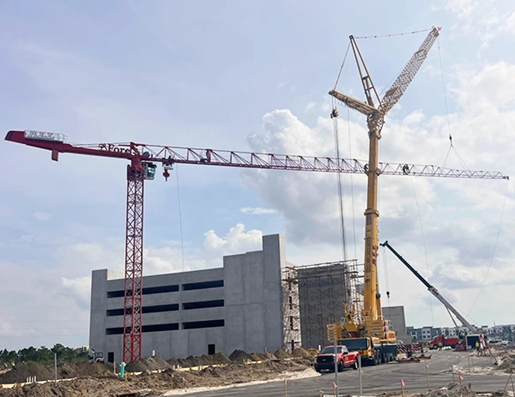
A 300-unit apartment complex marks the return of ALL Sunshine Crane Rental Corp., a member of the ALL Family of Companies, to the tower crane market in the Orlando metro area.
T.J. Wicklander, general manager of ALL Sunshine Crane Rental Corp., was previously a sales rep at ALL’s Chicago branch, Central Contractors Service. Chicago is a tower-crane heavy town. At one point a few years ago, more than 30 of the 50 tower cranes dotting the Chicago skyline originated with Central. So, getting back into tower work was like a homecoming for Wicklander, who estimates it’s been more than a decade since his current branch had erected a tower in Orlando, focusing instead on other equipment opportunities.
The new apartment complex, Parkway Crossing, will be a modest four stories tall, but will encompass a sprawling, nearly six-acre parcel. ALL is providing two Potain MDT 219 tower cranes, positioned at opposite ends of the job site, to assist with construction.
Each Potain MDT 219 has an 11-ton capacity, a 360-degree rotating main boom of 159 feet, and a jib that reaches 213 feet. The towers will occupy a small footprint on the jobsite but can cover large areas, making them ideal for longer term construction projects. They also feature Manitowoc’s Crane Control System (CCS) for additional efficiency and precision.
With each tower placed at opposite ends of the construction site, the pair can cover the entire project with a small overlap in the center, where the parking garage will be located.
Contractors are discovering that they can affordably use multiple towers on larger jobs and reduce reliance on the more common crawlers, rough terrain cranes, and truck cranes, long a hallmark of material handling in construction.
“Due to the configuration of this piece of land, it would have been difficult to fit a standard crane,” said Wicklander. “Then, on one end of the jobsite, there’s a retention pond that would have created close quarters as construction progressed. These site-specific issues made the twin towers a perfect solution.”
A tower’s small footprint also reduces traffic and clutter on the jobsite, while offering outstanding up-and-over reach, allowing access to the complete work area. One tower can replace several specialized pieces of lift equipment, particularly crawlers and RTs, which would need to traverse the site and require the ground prep and requisite labor for ground prep and equipment operation. Towers also run cleaner with no exhaust, loud engines, or noise ordinance issues.
Wicklander appreciates how the project showcases the ability of ALL’s national branches to work together. “To build the first crane, we received sections of tower from sister branches in Tennessee and North Carolina,” said Wicklander. “Then the tower erector technician came over from our Atlanta branch to help set it up.” He notes that the second Potain MDT 219 will be coming entirely from the ALL branch in Knoxville, Tennessee.
Of course, Florida tower cranes have to take into account a major consideration that the Chicago towers of Wicklander’s professional past don’t: hurricanes (even if Chicago is known as the Windy City). Wicklander credits Sam Moyer, general manager of ALL Tower Crane and a civil engineer, as well as application engineer Daniel Giera, with doing the research and performing the calculations necessary to safely select tower cranes appropriate for the Orlando project.
